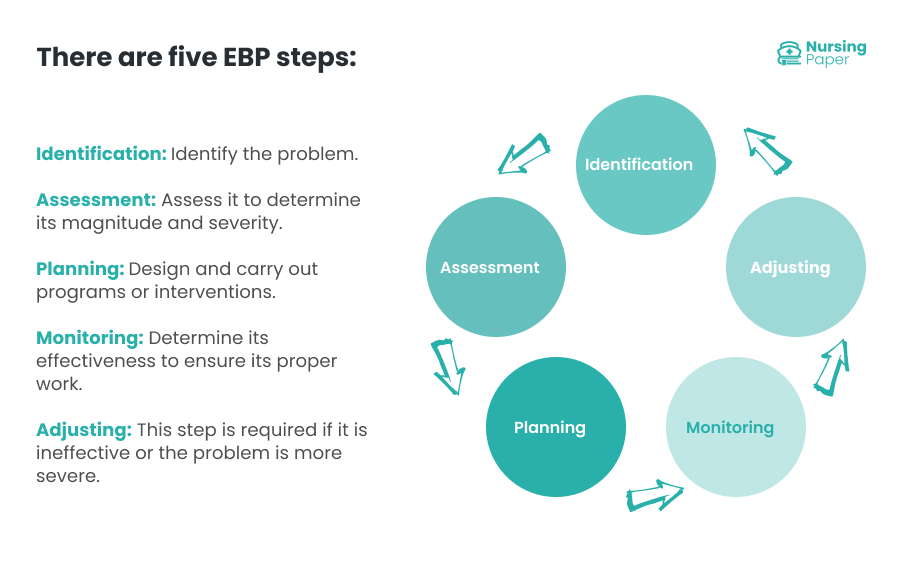
Main Steps of Evidence Based Practice for Nursing Specialists
Asking What Is Evidence-Based Practice in Nursing? Answered Here!
The consideration of current scientific evidence and practices is extremely important in order to gradually improve nursing care. Such an approach, also known as Evidence Based Nursing (EBN), is gaining more and more attention in nursing practice. Read on to learn about what is evidence-based practice in nursing, and discover the basic steps to your evidence based practice.
First of all, let’s formulate the basic evidence based practice definition before proceeding with the steps.
- Admission/Application Essay
- Admission Editing
- Admission Proofreading
- Annotated Bibliography
- Argumentative essay
- Article
- Article paraphrasing
- Article review
- Assessment
- Assignment
- Book Report/Review
- Business plan
- Capstone Project
- Case Study
- Concept map
- Concept paper
- Conference Paper
- Coursework
- Critical review
- Critique
- Custom List of Topics
- CV
- Data analysis
- Defence Presentation
- Discussion Post
- Dissertation
- Dissertation Chapter - Abstract
- Dissertation Chapter - Discussion
- Dissertation Chapter - Introduction Chapter
- Dissertation Chapter - Literature Review
- Dissertation Chapter - Methodology
- Dissertation Chapter - Results
- Dissertation revision
- Editing
- Essay
- Evidence-based practice paper
- Exam Answers
- Formatting
- Grant proposal
- Interview essay
- Lab Report
- Letter of recommendation
- Literature review
- Literature review outline
- Marketing plan
- Math Problem
- Multiple Choice Questions
- Non-word assignment
- Nursing care plan
- Nursing teaching plan
- Other
- Outline
- Paraphrasing
- Personal Statement
- PICO/PICOT Questions
- PowerPoint Presentation Plain
- PowerPoint Presentation with Speaker Notes
- Problem solution
- Proofreading
- Quality improvement project
- Reaction paper
- Reflection paper
- Reflective Journal
- Report
- Research Paper
- Research Proposal
- Retyping (PDF / PNG / Handwriting to Word)
- Revision
- Scholarship Essay
- Scoping review
- Shadow health assessment
- Soap notes
- Speech
- Statistical Analysis
- Statistics Project
- Summary
- Swot-analysis
- Systematic review
- Term Paper
- Thesis
- Thesis chapter - Background
- Thesis chapter - Conclusion & future works
- Thesis chapter - Implementation
- Thesis chapter - Introduction
- Thesis chapter - Other (not listed above)
- Thesis chapter - Results & evaluation
- Thesis chapter - Theory & problem statement
- Thesis literature review
- Thesis Proposal
- Thesis revision
- Topic Suggestion
- Topic Suggestion + Summary + References
Evidence Based Nursing ( EBN ) is an approach to making quality decisions and delivering nursing services. The base for quality decision-making is personal clinical expertise combined with the most up-to-date, relevant research on the subject.
The approach is based on evidence based practice (EBP). So why is evidence based practice important? EBN uses the most modern care methods and steps. These methods have been proven by evaluating high-quality studies and statistically significant research results. EBN’s goal is to improve health and safety while taking steps to provide cost-effective care to improve outcomes for both the patient and the healthcare system practices based on evidence. Take steps to learn more about the steps of evidence based practice here.
Reasons Why is Evidence Based Practice Important Explained
EBP allows taking steps for health professionals to draw conclusions about the evaluation of existing practices and standard operating procedures for clinical care from the practice. There is also much other reliable data available to address the problems they encounter daily.
Thus, EBP requires the use of the most current and up-to-date evidence based information and observations to take steps to solve clinical cases during practice. EBP helps to get rid of the outdated method of sole reliance on book knowledge. Medical professionals tend to base on it because they handle a lot of information for their evidence based practice essays, most of which they take from books.
However, evidence based nursing should not be stubborn steps to implementation of new practices. At the very least, it must be a combination of the following:
- Application of new knowledge based on study results is among the most important steps.
- A nurse’s own experience is also a crucial step in practice.
- Personal preferences and wishes of the person belong to the most important steps as well.
According to experts, only when all steps of evidence based practice come together, can one achieve the best result and thus the best quality of care.
Take 7 Steps of Evidence Based Practice to Succeed
EBP is a process based on collecting, evaluating & integrating valid, clinically meaningful and applicable research. The evidence used to change practice or make a clinical decision can be divided into 7 steps of evidence based practice. They vary in research type and quality. For example, when searching for what is evidence based practice in nursing you’ll find that many proficient experts like ours often answer that there are just 5 basic steps.

1st step of evidence based practice: cultivating the Spirit of Inquiry. It’s the first among numerous steps of evidence based practice. An inquiring mind is an attitude that encourages one to ask questions about existing practices. Cultivating a spirit of inquiry allows health care providers to question current methods of practice. What’s more, it allows challenging those practices to bring about improvement and change. These are some key elements and steps to promote EBP:
- Always question current practices as a nursing professional.
- Incorporate EBP as a higher standard base and integrate competencies for EBP.
- Involve EBP mentors so skills and knowledge can be provided to others.
- Use tools to enhance EBP (e.g., meetings, educational/teaching time, access to, etc.)
- Increase support and the ability for leaders to model valued EBP skills.
2nd step of evidence based practice: formulating PICOT Question. PICOT-formatted questions refer to the following aspects:
- Patient, population, or problem (P).
- The topic of interest or intervention (I).
- Comparison group.
- Outcome (O).
- Time frame (T).
Asking questions creates a search that provides the most relevant and highest quality information on a topic. At the same time, this step reduces the time required to create those search results.
3d step of evidence based practice: searching for and collecting relevant evidence. To proceed with the steps of evidence based practice, you need to begin the search for evidence and use each keyword from the PICOT question you formed. Once you reach the decision on the intervention or treatment, you can assess the research to determine the strongest evidence. There are seven levels of evidence, with Level I being the strongest quality and Level VII being the poorest quality.
4th step of evidence based practice: critically appraising the evidence. To begin the process of critical appraisal, you must ask three questions. It’s meant to determine the relevance of the evidence and whether it applies to the population served. The three questions from this step are:
- Are the research findings reliable?
- What are the outcomes?
- Are the results applicable to patient care?
After these three questions are asked, the evidence assessment continues by creating an evidence synthesis. This synthesis compares multiple studies to see if they are consistent with each other.
5th step of evidence based practice: integrating the evidence. After assessing the evidence, it must be linked to the provider’s expertise and the patient’s preferences. Medical professionals encourage patients to participate in decision-making processes. Therefore, the patient may decline treatment even if the trial is successful. In addition, examination findings and medical history may reveal further contraindications to a particular evidence based treatment. Finally, the availability of health resources may limit the implementation of treatment, even if it has been found to be effective in a trial.
6th step of evidence based practice: evaluating results. The next phase is the steps of evidence based practice in nursing. The process is to evaluate whether the treatment was effective in terms of patient outcomes. Again, at this step, evaluating results to determine the impact of evidence based change on health care quality is important.
7th step of evidence based practice: disseminating results. The final step is to share the information, especially when positive results are achieved. By sharing the results of an evidence based practice nursing process, others can benefit. At this step, some methods for disseminating the information include presentations at conferences, roundtables within one’s institution, and journal publications.
Most Interesting Evidence Based Practice Nursing Topics to Choose
EBP nursing topics can cover a vast range of various areas. Sometimes, the choice of the appropriate topic might be a daunting task. At this step, whenever you are working on an EBP project, the easiest way would be to formulate it as a PICOT question. For example:
- The main aspects of care of intoxicated patients within the first 24 hours of hospitalization.
- The effects of insomnia treatment on hospitalized persons.
- Methods and techniques for communicating with those having depression.
- The methods for identifying psychosis-prone people.
- The best techniques for the care of those with suicidal tendencies.
Of course, these are just general ideas of your project’s topic we’ve gained from examples of nursing evidence based practice essays. However, you can use them as the basis for your own ideas and specific evidence based practice nursing topics ideas.
To integrate EBN into nursing practice, nurses must be aware of how important research is in terms of improving nursing care and the main steps of the process. The experiences of the nursing staff and the wishes of the patients should not take a back seat. The right steps are just as important as the study results. The aim of all steps should be to achieve a good mix and thus combine evidence and experience. The basic steps of evidence based practice in nursing allow medical professionals to achieve the best results in patient care.
- Admission/Application Essay
- Admission Editing
- Admission Proofreading
- Annotated Bibliography
- Argumentative essay
- Article
- Article paraphrasing
- Article review
- Assessment
- Assignment
- Book Report/Review
- Business plan
- Capstone Project
- Case Study
- Concept map
- Concept paper
- Conference Paper
- Coursework
- Critical review
- Critique
- Custom List of Topics
- CV
- Data analysis
- Defence Presentation
- Discussion Post
- Dissertation
- Dissertation Chapter - Abstract
- Dissertation Chapter - Discussion
- Dissertation Chapter - Introduction Chapter
- Dissertation Chapter - Literature Review
- Dissertation Chapter - Methodology
- Dissertation Chapter - Results
- Dissertation revision
- Editing
- Essay
- Evidence-based practice paper
- Exam Answers
- Formatting
- Grant proposal
- Interview essay
- Lab Report
- Letter of recommendation
- Literature review
- Literature review outline
- Marketing plan
- Math Problem
- Multiple Choice Questions
- Non-word assignment
- Nursing care plan
- Nursing teaching plan
- Other
- Outline
- Paraphrasing
- Personal Statement
- PICO/PICOT Questions
- PowerPoint Presentation Plain
- PowerPoint Presentation with Speaker Notes
- Problem solution
- Proofreading
- Quality improvement project
- Reaction paper
- Reflection paper
- Reflective Journal
- Report
- Research Paper
- Research Proposal
- Retyping (PDF / PNG / Handwriting to Word)
- Revision
- Scholarship Essay
- Scoping review
- Shadow health assessment
- Soap notes
- Speech
- Statistical Analysis
- Statistics Project
- Summary
- Swot-analysis
- Systematic review
- Term Paper
- Thesis
- Thesis chapter - Background
- Thesis chapter - Conclusion & future works
- Thesis chapter - Implementation
- Thesis chapter - Introduction
- Thesis chapter - Other (not listed above)
- Thesis chapter - Results & evaluation
- Thesis chapter - Theory & problem statement
- Thesis literature review
- Thesis Proposal
- Thesis revision
- Topic Suggestion
- Topic Suggestion + Summary + References







































